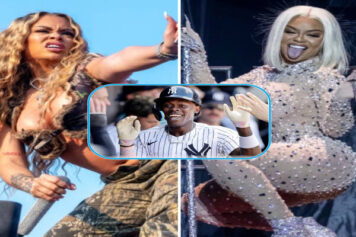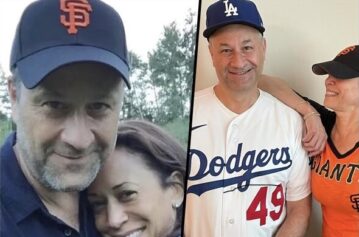To put a bow on a year that has seen the issues of racial injustice and systemic racism pushed to the forefront of America’s consciousness, MLB has gathered a collection of young Black MLB superstars and young players associated with MLB’s successful diversity programs which identify, develop and inspire the future Black Knights of baseball, for a candid 44-minute discussion on the “The Culture & Journey of the Black Baseball Player” powered by @MLBDevelops.

For the first time since 1984, the Rookie of the Year for both leagues was Black.
AL ROY Kyle Lewis (Outfielder – Seattle Mariners), teammate Justin Dunn (a rare Black pitcher), NY Mets first baseman Dominic Smith (first MLB player to take a knee for George Floyd and Jacob Blake) and former MLB Manager & MLB Baseball Development Consultant Jerry Manuel participated in the important discussion.
READ MORE: What Would Jackie Robinson Say About How MLB Teams Handled The Jacob Blake Protests?
The special panel, which was moderated by Seattle Mariners play-by-play announcer Dave Sims and features conversations about the group’s challenges and triumphs as Black men in both baseball and America.
Other topics addressed were the formation of The Player’s Alliance and the COVID-19 pandemic. The discussion will be available LIVE on Tuesday, November 24th at 1:00 p.m. ET and is available at https://www.mlb.com/video/cultural-journey-of-black-players.
READ MORE: MLB’s Black Knights Discuss The Changing Face Of Pro Baseball
Following are a few poignant quotes from the conversation about the experiences these African-American players have endured along their journey.
Kyle Lewis
“Sometimes I would go try to play in some of the other parks, [I’d] kind of get pushed to the back, kind of get overlooked a little bit. It’s never like overtly a racial thing, but you definitely had a little bit of a divide there, a little bit of a disconnect that I had to navigate through.”
- On what needs to be done to attract more Black players to the sport: “I think we need to embrace the culture…play, have fun with it, talk smack to each other. If we can embrace that a little bit in a way that just makes it more of a safe place again to where we can just enjoy one another. I think when a kid watches, the kid will see that ‘okay, they’re not disrespecting the game, they’re playing the game hard, they’re playing the game the right way, but they’re having a lot of fun with it and they’re really being who they are.”
- On two Black players winning Rookie of the Year Award: “It’s super special, man, especially with the tone of the country and the tone of the world right now…this has been going on for a while, so we’re always fighting to make our mark…give something for the community to look up to. So, if I have the opportunity to expand my platform in that way, or just do something that people can look at and get on there and speak well. I just take a lot of pride in that. I know Devon does as well.”
Dominic Smith
“My mom taught me to respect people how you want to be respected, and love people the way you want to be loved. I treat people with the utmost respect because that’s what I want them to do to me. So, to just see people to be treated as wrong or with disrespect just because of our skin color or where we come from or the type of fashion we like or the type of music we listen to…me personally, I just wasn’t raised like that.”
- On how he would improve the situation for Black people: “I think we just have to continue to have that tough conversation and then keep pushing that conversation forward with our peers, with the Front Office. I know we just got a new owner, and they already reached out and already commended me on my stance and how I feel. They let me know I have their full support and they want to bring more diverse opportunities for the community of New York.
Justin Dunn
- Reaction and conversations following civil unrest: “We were fortunate enough to have a Clubhouse, top to bottom, that understood. We’re a pretty tight family, and pretty close. Kyle and I were fortunate enough, along with all the other young African American players to have some older, veteran presence in Dee Gordon and Taijuan Walker, for a little bit, who were able to speak up and have those conversations not only with our teammates but with upper management and ownership.
I know myself, and I’m sure Kyle is extremely grateful for everything the Mariners did and how open they were for having our back and giving us the ability to speak and getting our message be heard. That day in San Diego was one of the saddest, but coolest moments I’ve ever been a part of. To have someone like Dee Gordon get up in the middle of the locker room and kind of burst out into tears and kind of show the pain. I think for a lot of our white teammates, became real at that moment…”
“Allowing yourself to be yourself on the field, that’s what’s going to get the younger generation to come back out and want to play again.”
Jerry Manuel:
“Coming into baseball, California was the first place that was into integrated schools… and then come to find out, I am the only Black player on the team. So, therefore you start to hear little jokes and little things like that. At that time, as a young man, I kind of came with a chip on my shoulder because of where I came from and the lenses in which I saw things and what I saw in the South.”
“It’s good to see and it’s good to know that the young people know that there is a difference, which there shouldn’t be, but there is a difference when it comes to the melanin of our skin. The key is as long as the mind is not enslaved, the body can be free. And that’s what we need our young men to be – is free. Free to express themselves, free to challenge the apparatus that’s in place now.”
“I hate that they have to experience that, but it does bring it back full circle from even in the day when I ‘came through. My first year as a rookie [1972], we had to stay on the different side of the tracks, it was three Black players. We couldn’t stay where everybody else stayed. But you know what? We welcomed it.”
“Sometimes I fault myself for not while managing, bringing someone else alongside me to take my spot. Rather than be comfortable, being the only…I think that’s a dangerous place to be as a Black man. Trying to say, well I’m the only announcer, I’m the only this, I’m the only that. That means I have fallen into the apparatus trap. I haven’t become myself and I haven’t brought my people with me.”



